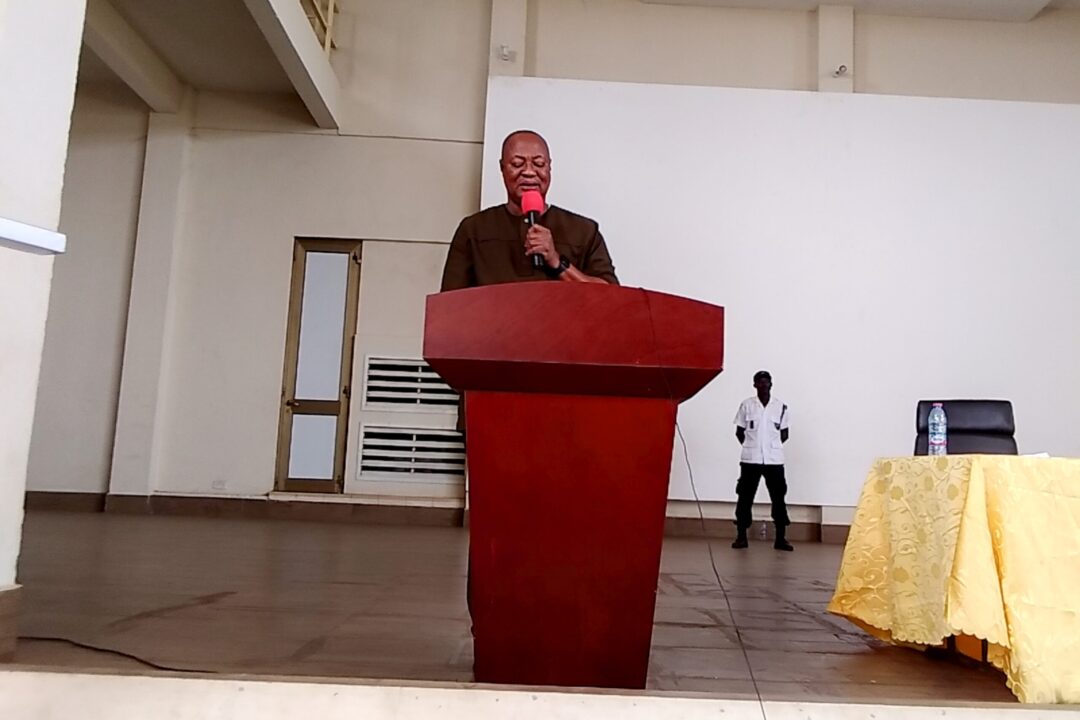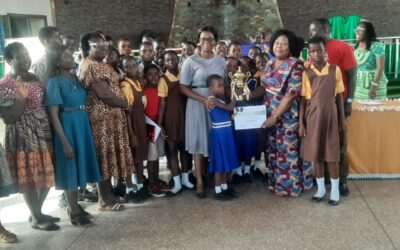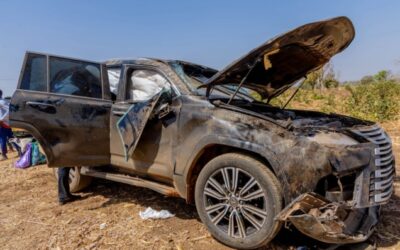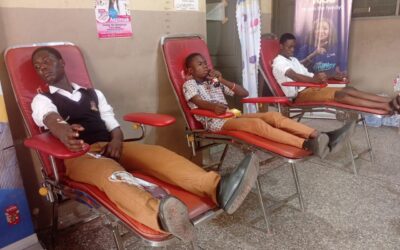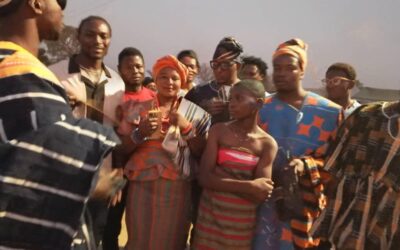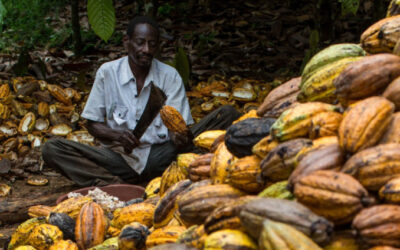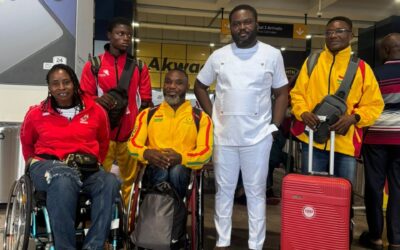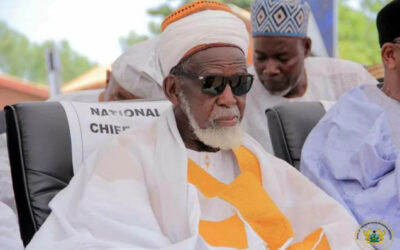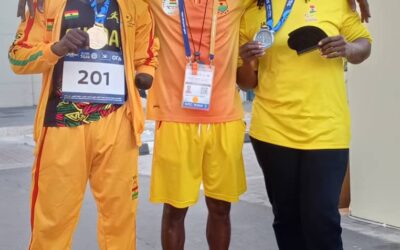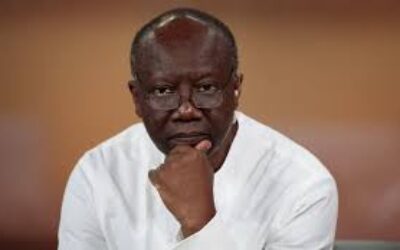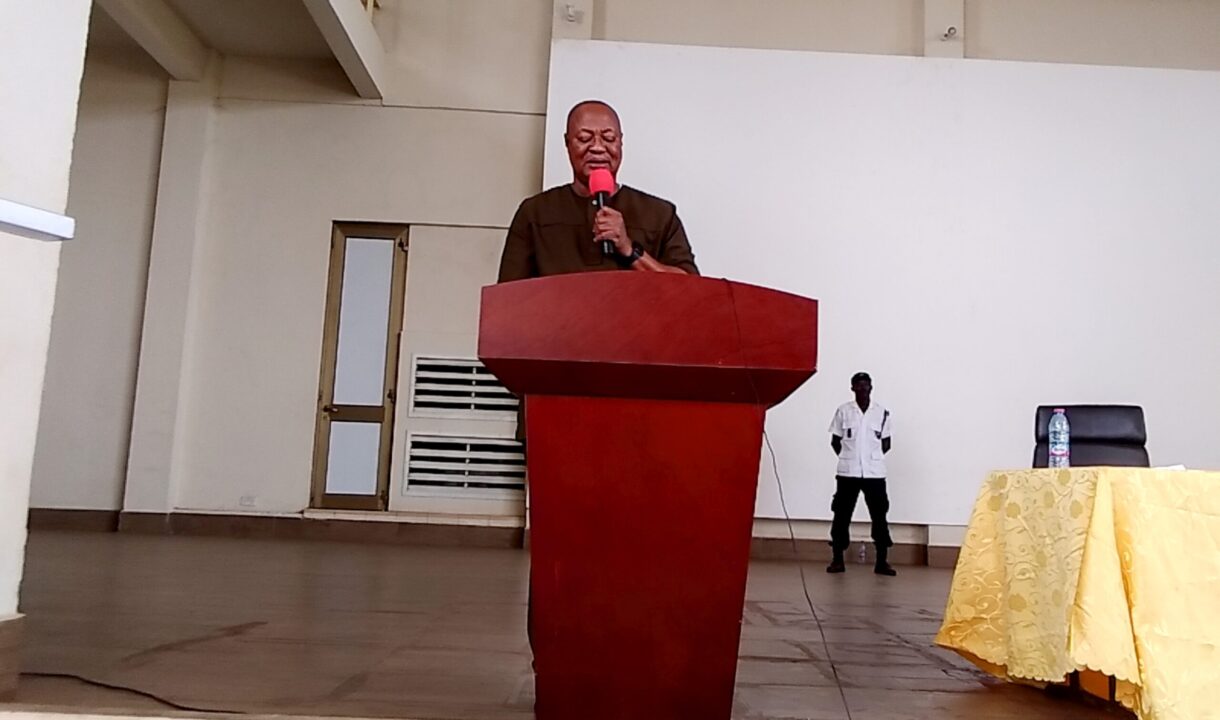SESSIONAL ADDRESS DELIVERED BY THE METROPOLITAN CHIEF EXECUTIVE, HON. SAMUEL PYNE DURING THE 1ST ORDINARY MEETING OF THE 3RD SESSION OF THE 8TH KUMASI METROPOLITAN ASSEMBLY (KMA) HELD AT THE PREMPEH ASSEMBLY HALL ON TUESDAY 14TH JUNE, 2022 AT 10:00AM
HON. PRESIDING MEMBER,
HON. MEMBERS OF PARLIAMENT,


HON. ASSEMBLY MEMBERS,
MANAGEMENT & STAFF OF KMA,
FRIENDS FROM THE MEDIA,
LADIES AND GENTLEMEN,

I deem it a great honour and privilege for the opportunity to deliver my much-awaited Sessional Address to the 8th Kumasi Metropolitan Assembly for the year 2022 and beyond. This address will outline my vision and plans for the duration of my tenure of office as the Metropolitan Chief Executive. It would also serve as the blue print for the pursuance of our agenda and a bench mark to assess the level of achievement at the end of the day.
Before I proceed, I would like to express my heartfelt gratitude to His Excellency, the President of the Republic of Ghana; Nana Addo Dankwa Akufo-Addo for the confidence reposed in me as a worthy nominee for the Office of the Metropolitan Chief Executive of Kumasi. Mr. President, thank you for the opportunity to serve the good people of Kumasi and Ghana as a whole.
To the Overlord of Ashanti; the Asantehene Otumfuo Osei Tutu II and Nananom, thank you would be an understatement. I am extremely grateful for your support, advice and encouragement so far. May the Almighty God bless you and your reign.
To my General Assembly members of Kumasi, what more can I say? Your massive support and confirmation of my nomination was unprecedented. You have so far, showed a lot of commitment and dedication to the course of putting Kumasi back on the radar. It is my hope that we will continue to dwell in unity and work hard towards the restoration of Kumasi.
To all who have, in one way or the other, contributed to my successful nomination and confirmation to this office and the good people of Kumasi, I say a big thank you for the opportunity to serve and promise on my honour, to work hard in justification of the confidence reposed in me.
Hon. Presiding Member,
I stand before this august House this morning, in fulfillment of the duty imposed on me by Section 28 (1) and (2)(a) of the Local Governance Act, 2016 (Act 936) which requires that I, as the Chief Executive, address the Assembly at the beginning of each session on the policies and programmes determined by the President and also present a report on the performance of the Metropolitan Authority, my Office, as well as the state of the metropolis.
Let me, therefore, start with the situational report on the various sectors which will be interspersed with my vision and proposed plans for their achievement.
GOVERNANCE
Hon. Presiding Member, Hon. Members, Ladies and Gentlemen,
As you are undoubtedly aware good governance is associated with effective and efficient administration which ultimately sets the tone for development and improved service delivery to the citizens. As such, it is one of my primary areas of focus. I intend to spearhead an administrative system that is more consultative, directed towards change and more so towards results.
In this direction, I have actively commenced monthly Core Management meetings with my Heads of Departments to establish and provide a strong leadership base, discuss issues, address challenges and implement decisions of the Assembly; as well as enable the Departments to function harmoniously towards the achievement of our common goals.
To enhance the decentralisation process within the KMA, all sub-structures of the Assembly; from the Sub-metropolitan Councils to the Town Councils have been duly constituted and are functioning as expected. It is my intention to at least keep things this way or make it better.
To ensure a holistic and coordinated approach to development, all players must be brought to the table. A cursory look at the way things have gone, so far, reveals that our Honourable Members of Parliament have been virtually missing from the equation. To engender their participation in our local governance, periodic meetings will be held with our Hon. Members of Parliament (MP) to discuss issues confronting the metropolis and solicit their support in designing solutions as well as capitalize on their lobbying skills to get projects and programmes for this metropolis. Already and as a step in that direction, the MPs have been included as members of the various sub-committees to arouse their active interest and sustain their participation as members of the Assembly to ensure they play their expected role in the development process.
Hon Presiding Member,
This is the era of co-designing where everybody matters in planning and implementation of public projects. This method allows everyone to feel involved and as such committed to ensuring success is achieved. As a Sustainable Development Practitioner, therefore, my administration would leave no stone unturned in ensuring that we rope in as many stakeholders as possible in the pursuance of our development agenda.
Also, I have realised that the holistic development of Kumasi cannot be achieved by KMA alone. It is therefore imperative that we rope in the Greater Kumasi Area for an all-hands-on-deck approach. This is because most of the development issues are cross-cutting, and would require a collaboration with all the other Assemblies within the city and even sometimes the extended areas to ensure an all-inclusive development of Kumasi and also address common challenges such as sanitation, “streetism” and public transport, among others.
Hon. Presiding Member,
You would agree with me that governance entails a whole lot and it is a shared responsibility which requires sustainability to make the desired impact. Much as we would do our part, it behoves us to solicit for the suggestions and ideas of our citizens in planning our development to make it whole. Our stakeholders should have a say in what we do on their behalf. To fulfil this requirement and as an ardent believer in sustainable development, I would like to encourage more interactions with our citizens to enable an exchange of ideas and a consideration of their inputs in our quest to arrive at decisions. We would make the extra effort to reach as many people as possible through various innovative means. To cut down cost while at the same time meet our objectives, we would devise other means of reaching the people, this can be done by going to them through various association or group meetings such as youth groups, men and women’s fellowships, etc. We will also use social media to reach people. This I believe will cut down costs and at the same time promote effectiveness; more like killing two birds with one stone.
Strengthening of Sub-Structures
In order to enhance decentralization, I am committed to strengthening the sub-structures through capacity building and ensuring resources are channelled into activities that will spearhead the social, economic and political needs of their areas. This will further lighten the burden on the Assembly. In this direction, capacity gaps and the required logistics would be identified and provided as much as possible.
As a sustainable development practitioner therefore, I will endeavour to ensure functional and reliable Sub-structures devoid of unnecessary political interference.
Hon Presiding Member,
The lack of permanent offices for some of our Sub-structures, especially the sub-metropolitan Councils, is an issue of great concern. In this regard, I want to propose that we put in place a scheme to provide permanent offices for our sub-metropolitan Councils as has been done for the Nhyiaeso Sub- Metro Council. This I believe would provide the right work environment to promote efficiency and effectiveness.
Public Relations
As earlier mentioned, the engagement and participation of our populace will be adopted as a fundamental policy measure during my tenure of office. As strategic partners, the media has been very essential in educating the public, disseminating information and partnering the Assembly to address issues.
However, our story often goes untold; the physical projects we undertake in various areas, interventions we put in place to address social issues and programmes executed mostly go unreported on or underreported.
Consequently, it is my desire, together with you, to improve and strengthen the KMA’s engagement with the media to create a positive perception about the Assembly through the following:
Institute periodic press meetings
Undertake periodic project tours with the media to showcase projects and programs undertaken
Develop media policy to streamline our engagement with the media.
Ultimately, we hope to set the agenda for the media rather than the current reactive phenomenon we are operating
Hon, Presiding Member,
It is envisioned that these engagements and partnerships with the citizens and media will help address the following;
Address the basic and unique needs of our people.
Mobilize the local people and resources for development
Encourage greater public and citizen participation in development activities.
Ensure that the people are well informed on the goals as well as the happenings at the Assembly which will engender ownership of projects and programs when implemented.
Encourage self-help initiatives.
Protection of the Public Purse
Hon Presiding Member,
You are no doubt aware that the financial position of the Assembly in recent years has not been the best. Revenue generation has dipped while expenditure rises with the rising cost of things. We also know that the Assembly continues to be bedevilled with judgment debts and huge costs in the management of waste and sanitation. This has made it difficult to undertake the desired number of physical projects over the years. It is therefore imperative that we control expenditure and ensure that we do not exceed our budget for the year, no matter what.
To this end, Management under my watch, has undertaken to do the following;
Prioritize expenditure and strictly adhere to the Annual Action Plan and accompanying Budget, as required.
Sanitize and reduce costs related to protocol, fuel and lubricants, among others.
Hon. Presiding Member, as a proactive measure I have instructed that all intended expenditures related to Hotels and Protocol should be expressly approved by me or the Co-ordinating Director before the expenditure is incurred.
Periodic internal auditing checks (Auditing) guided by the Public Financial Management Act, 2016 (Act 921) and Regulations, will be intensified to monitor the situation in order to reduce wastage. Feedback from these exercises would be used to improve financial controls and ensure the judicious use of the ever scarce financial resources.
FINANCE
Hon. Presiding Member,
From the backdrop of the protection of the public purse let me go directly to talk about our finances.
I believe we all agree that finance is the mainstay of our existence as an Assembly and it is what gives us the powers of a body corporate.
The Assembly, over the years has had, as its main sources of funding, the Internally Generated Fund (IGF), District Assemblies Common Fund (DACF), People with Disabilities (PWD) Fund, Social Investment Protection Fund (SIF), District Development Fund (DDF), now called the Responsive Factor Grant (RFG), Central Government Treasury Accounts (for the Departments) and other Grants.
Of all these funds, it is only the IGF that is fully controlled by the Assembly. The rest of the funds are generally beyond the control of the Assembly because they are tied to specific projects or programmes and come with strict rules on how they should be disbursed.
This therefore leaves us with only our IGF to take care of our operational costs, salaries and allowances as well as all other recurrent expenditure. This puts a lot of pressure on the IGF in view of our ever-increasing needs vis-à-vis our scarce resources.
Hon. Presiding Member,
It behoves the Assembly to put in place effective and efficient measures to generate as much internal revenue as possible if we really want to bring development to our people.
A careful look at the situation leaves us with no option but to take steps to automate our revenue generation system as much as possible. I believe that a reduction in the human interface will help drastically reduce the leakages and under-reporting. This is our best bet in raising more IGF for development.
Fortunately for us, Measures are being put in place, mainly to automate all the revenue management processes of the Assembly of which you will be briefed in detail in due course.
Debt Stock
Hon. Presiding Member,
Unfortunately, KMA has over the years, built for itself a huge debt stock. Several factors have culminated in this phenomenon. Some of these factors include; the late releases of the Common Fund, award of contracts in anticipation of promised funds, poor management of contracts, lack of interest in some court cases, abrogation of contracts without following due process, and most of all poor record keeping. These and several others have resulted in our current debt situation.
These actions, omissions or inactions, sadly have come from some of our own officers and strangely some Honorable Members. Our ineptitudes have led to huge judgement debts and other damages awarded against the Assembly over the years.
Permit me to use this opportunity to discourage such acts on our part. Let us adhere to the rules of engagement on such contracts, seek legal advice and guidance from our Legal Department and above all make it a habit to seek not our personal interest but that of the Assembly.
We should bear in mind that these huge debt portfolios make us unattractive to investors and would derail our vision of making Kumasi the preferred investment destination. Let us all resolve not to allow these things to happen to the Assembly again.
At the time I took office, the indebtedness of the Assembly was and is still a major concern. Efforts are being made to reduce the debts. At the time of taking over, the total debts of the Assembly stood at Fifty-four Million, One Hundred and Ninety Thousand, Four Hundred and Fifty-eight Ghana Cedis, Ninety-three Ghana Pesewas (GH¢ 54,190,458.93). This consists of an IGF debt of One Million, Three Hundred and Fifty-eight Thousand, Four Hundred and Fifty-nine Ghana Cedis, Sixty-six Ghana Pesewas (GH¢1,358,459.66) while that of the District Assemblies Common Fund is Three Million, Ninety Thousand, Five Hundred and Eight Ghana Cedis, Seventy-six Ghana Pesewas (GH¢3,090,508.76), and our current Waste Management debt is Forty-nine Million, Seven Hundred and Forty-one Thousand, Four Hundred and Ninety Ghana Cedis, Fifty-one Ghana Pesewas (GH¢49,741,490.51).
We have, so afar, been able to reduce our debt stock by Nine Million, Six Hundred and Nine Thousand, Five Hundred and Forty-one Ghana Cedis, Seven Ghana Pesewas (GH¢ 9,609,541.07) representing 15.06% of the total debt recorded in 2017 which was Sixty-three Million, Eight Hundred Thousand Ghana Cedis (GH¢63,800,000.00).
Going forward, we are going to ensure that we seek proper legal opinions in addition to the use of Alternative Dispute Resolution (ADR) to resolve our outstanding court cases, as much as possible and negotiate with our creditors for suitable payment plans.
We are, also, going to ensure that the requirements of the Public Financial Management Act 2016 (Act 921), which seeks to regulate the financial management of the public sector and ensure that public funds are sustainable and consistent with the level of public debt, are adhered to strictly. We believe strongly, when these measures are instituted, we will avoid financial problems, protect the public purse and ensure the judicious use of public funds for the betterment of people of Kumasi.
To bring financial discipline to the Assembly, I will need the unflinching support and cooperation of all staff and Honourable Members of the Assembly.
Revenue Mobilization
Now comes my update on the revenue generation aspect of our finances. The sources of our Internally Generated Fund (IGF) are rates, lands, fees, fines, licenses, rent and miscellaneous sources. According to the financial records as captured on 31st December, 2021, there has been an increase in our revenue collection from Twenty Million, Nine Hundred and Fifty-Two Thousand, Three Hundred and Fourteen Ghana Cedis, Fifty-Two Ghana Pesewas (GH₵20,952,314.52) in 2020 to Twenty-two Million, Three Hundred and Ninety Thousand, Two Hundred and Ninety-two Ghana Cedis, Sixty-four Ghana Pesewas (GH¢22,390,292.64) as at 31st December, 2021.
It is strongly believed that the Assembly has the capacity to generate more revenue than we are currently doing. Some of the reasons that have accounted for low revenue include:
Management Challenges; This includes data challenges, the capacity of revenue collectors, communication and stakeholder engagement challenges, enforcement, compliance and prosecution challenges, as well as monitoring and evaluation challenges.
Process/Operational Challenges. Difficulty in the accuracy of the budgeting process, non-standard bills and reminder notices which confuse tax payers and enable fraud, paper-based revenue collection, too many intermediaries in the collection process leading to high costs of collection and leakages.
Information Systems Challenges. Tax based information is mostly managed in paper making it difficult to access, IT applications are mostly individually managed and the use of unsecure hard and soft ware facilities, and lack of updates of information collected.
All these challenges simply point to the need to improve our revenue generation systems in order to guarantee a good financial performance. Our revenue management systems have largely remained manual over the years thereby giving room for manipulations and leakages in all forms.
To add to this, the absence of a reliable data did not allow for proper budgetary and financial projections. We have tried to stem this tide by taking certain bold measures such as restructuring the Revenue Unit, piloting the use of mechanized collection, improving monitoring and penalizing wrong doing, among others to check the anomalies.
We have, however, realized that digitization is the answer to most of these challenges and have accordingly explored ways of shifting towards this method. Fortunately for us, there was room for such an intervention from our Donor Partners, Agence Francaise de Developpement (AFD) through the African Smart Towns Network Project (ASToN).
The Africa Smart Towns Network (ASToN), involves the use of smart technology in the management and operations of cities.
The Assembly, after careful consideration, decided to focus on the E-tax option; that is, digitizing revenue mobilization and reporting by establishing a comprehensive database of all property and their values with commercial and residential demarcations for proper tax management purposes.
This no doubt, ties in beautifully with my goal on Sustainable Digital Revenue Management as one of my priority areas and will go a very long way to mitigate our challenges in revenue mobilization.
The basic reason for opting for this is to enable us build a reliable revenue data base to serve as a spring board for maximizing our collection.
I can report that the Data Centre has been set up, computers provided, networking done and bills printed out using the new software.
Point of Sale devices have been procured for the collection of revenue at certain designated areas as a pilot. This is to allow us to learn from the challenges of the new system and find solutions before replication in other areas. In due course more point of sale devices would be purchased and the scheme rolled out gradually to cover the rest of the metropolis.
WASTE MANAGEMENT AND ENVIRONMENTAL SANITATION
Honourable Presiding Member,
The vision of KMA for waste management is to promote sustainable, environmentally sound and cost-effective waste management practices for the citizenry through innovative technologies, customer service and education. Undoubtedly, Effective waste management is one of the primary drivers of public health which leads to healthier citizens who can contribute better to the local economy.
Solid Waste Management
Hon. Presiding Member, Hon. Members,
Solid Waste Management has remained one of our biggest challenges; the dumping of solid waste into open areas, storm drains and indiscriminate littering, particularly in the CBD, has exacerbated our sanitation-related challenges which come in its wake with attendant health issues. Indeed, improved sanitation in the metropolis is a shared responsibility involving residents, businesses, commuters and other stakeholders.
Though a daunting task, it is my desire to pursue a “Clean Kumasi Agenda” aimed at improving sanitation and waste management towards restoring Kumasi to its past glory.
I have, therefore, instituted a monthly cleanup exercise to be undertaken throughout the city to help rid the city of filth. This venture is capital intensive and as such requires a lot of resources to make it sustainable. To help us raise funds to meet this expenditure, letters soliciting for assistance have been sent out to corporate bodies and institutions for support either in cash or kind as part of their corporate social responsibility.
Our hope is to provide a clean, litter-free and healthy environment for citizens.
To ensure that the aforementioned vision materializes, various private actors are deeply involved at different stages of the waste management service chain. As you are already aware, some private service providers carry out the collection and transportation of solid waste within the metropolis on our behalf.
In this connection, proper integration of these services and collaboration with service providers will be pursued to drive the “Clean Kumasi Agenda”.
This will require the provision of facilities like transfer stations, waste separation containers, composting hubs and waste to energy plants. We are seriously exploring avenues and leaving no stone unturned in our search for lasting solutions and the provision of these facilities to enhance waste management in the metropolis.
Holistic Reinforcement for Sustainable Development Project (HORESD)
Hon. Presiding Member
Fortunately, on our part, the HORESD project has come to our aid.
The concept of this project ties in beautifully with my vision under waste management to keep the city clean by making solid waste a resource for sustainable job creation and income generation for 500 unemployed youth and people at risk of social exclusion by 2024.
The KMA in partnership with Mancomunitat de la Ribera Alta (MANRA) of Spain and the City-County of Praia of Cape Verde has secured 2.5 million euros from the European Union to implement a project dubbed “Holistic Reinforcement for Sustainable Development” (HORESD).
This project will help the Assembly to develop a Strategic Urban Solid Waste Management Plan, form a Territorial Management Group and a Technical Working Group that will govern and operationalize a coherent waste collection system in the city.
Pilot projects that will improve waste management services in the city through the creation of green jobs will be carried out. Thus four (4) Composting Stations and two (2) Eco-Recycling Stations will be created to promote the concept of a circular economy.
Hon. Members, the project will also establish a School for Sustainable Entrepreneurship, that will help a wide range of entrepreneurs in Kumasi to develop green jobs. Capacity building, investment and provision of seed capital will be facilitated to make it a reality, giving priority to the people at risk of social exclusion and the unemployed youth.
Through this project, over 100 people at risk of social exclusion and unemployed youth as well as 10 professionals will be directly employed and earn a sustainable income and improve livelihood.
A permanent information center, called “Green Point”, to assist with citizen awareness creation and capacity building has been set up, as we speak, at Asokwa, near the Asokwa Presbyterian Basic School.
The following activities are expected to be carried out under the project:
Implementation of an integrated waste management and collection system,
Construction of 4No. small community composting stations,
Construction of 2No. small recycling “eco-stations”,
Implementation of an intelligent cloud/GPS/app system for managing garbage collection routes,
Creating a circular economy by training and setting up people who work informally in the waste sector and especially people at risk of social exclusion such as women, disadvantaged youth, those with special needs and entrepreneurs.
This project, we believe, will go a long way to address some of our waste management challenges.
To complement this project, the Assembly intends to renovate the liquid waste treatment facilities to ensure the value chain is complete.
Greater Kumasi Metropolitan Area Sanitation and Water Project
Hon. Presiding Member, Ladies and Gentlemen,
The current household toilet coverage per our records stands at 34%. The KMA’s target, however, is to ensure that at least 70% of households and institutions have decent toilets by the year 2025. The Assembly, recognizing the huge gap to fill, is exploring various schemes and opportunities to address the challenge.
Under the Greater Kumasi Metropolitan Area Sanitation and Water project, a four (4) year programme is being implemented by the Government of Ghana, through the Ministry of Sanitation and Water Resources.
The aim of the project is to provide household and institutional toilets in pro-poor urban communities to curb open defecation, among others.
I will want to inform this August House that, presently, thirty – five (35) schools have been selected to benefit from the construction of institutional toilets in the Kumasi metropolis. A consultant is currently validating the schools selected to pave way for actual construction to begin.
With regard to the household toilets, 200 out of the 500 registered, have so far been constructed.
Sensitization is also ongoing to get people adequately informed to take advantage of the opportunity to provide toilets for their households.
To this end, I implore Hon. Members to send the message down to the electorates to take advantage of the project in our quest to achieve improved access to sanitation.
Logistical Support
Hon. Members, we will all attest that the Waste Management Department is presently grappling with some logistical constraints which hinder the effective performance of their functions. The Clean Kumasi Agenda can not materialize if the Department’s required logistics are not complemented.
From this inference, I intend to increase the capacity of the Department in the areas infra;
Vehicle/equipment holding; The following vehicles will be procured to revamp the vehicle/equipment holding of the department-
2 12 tons capacity waste compactor trucks
1 skip loader
1 roll-on-off truck
The presence of these vehicles will advance the achievement of the Department’s role of a clean and healthy environment.
Vehicle Maintenance
As you are already aware, the Mechanical Workshop situated at the Department has been in a deplorable state for some years now. To revamp the workshop, we will undertake the following
Renovate the Mechanical Workshop including the stores
Re-equip the mechanical stores and
Re-train the Mechanics so that the new equipment procured could be well maintained to increase its life span.
Enforcement of Bye-Laws on Sanitation
Hon. Presiding member,
Permit me to state that the habit of littering and indiscriminate dumping of waste is unfortunately increasing. We, therefore need to take steps to curb this tide.
To address this menace, a task force will be constituted to ensure that this nuisance becomes a thing of the past, particularly in the Central Business District. The Prosecution Section of the Assembly would ensure a swift prosecution of offenders to serve as a deterrent to recalcitrant persons.
Cleaning of the Central Business District
Congestion and the resultant tonnes of waste left in the Central Business District necessitated the introduction of the night cleaning schemes. However, the littering and increased structures coupled with our deteriorating equipment has posed serious challenges to our operations. In a bid to maintain a clean, litter-free and healthy CBD for the citizenry, the decongestion of the CBD is key to achieving the Clean Kumasi agenda and I will, with your unwavering support, pursue it.
egal Issues
Hon Presiding Member, the Legal Department is paramount to the development of the Assembly considering the contracts and clients we deal with on a daily basis. The department is however challenged with inadequate man power which leads to a heavy work load. I therefore intend to hire additional hands for the Legal Department and give them the needed resources and logistics to aid the department to function efficiently.
Hon. Presiding Member,
Due to the non-compliance to legal frameworks, misappropriation of funds and dis-respect of contracts, the Assembly has accumulated a lot of judgement debt over the years. I’ll however cooperate with our legal leads and other stakeholders to negotiate with our partners on how best the judgement debts can be reduced and make sure that funds are allocated on time and used appropriately.
We will ensure that the essential Staff who are directly responsible for our engagements with other cooperate bodies would be trained properly on the mechanisms of legal frameworks to guide their work.
URBAN MOBILITY (TRANSPORT)
Hon. Presiding Member,
The Transport Sector is one of the priority areas for my administration. This is because of the strategic location and commercial nature of Kumasi and the important role transport plays in the development of this city.
Our goal is “to have a well-regulated public transport system and an improved flow of traffic in all major intersections in Kumasi.
In pursuit of this goal, the city has over the years sought to create a very cordial relationship between the KMA and all major stakeholders in its efforts towards achieving these goals.
Efforts are made to locally engage the appropriate stakeholders to collectively find solutions to issues in this sector.
Regular Engagements are held with the Transport Unions to ensure that decision-making and implementation involves everybody who matters and is not seen as an imposition by the Assembly.
These engagements have culminated in the conduct of joint enforcement activities to fight against illegal operators popularly known as the “waa–waa” drivers.
Jointly, the Assembly is gathering data on transport operators in the city from the Branch and Local Levels. This will help us know how many vehicles and members each union or branch has at each station. We can then use the data reliably in the allocation of slots for stations and also in the issuance of vehicle stickers for both intra and inter-city trotros, taxis and buses.
Smart Office Project
To help the Assembly properly operate in this sector, the smart city/office project was introduced to KMA. The Transport Department was chosen as a pilot. In view of this, a massive renovation and refurbishment of the office was carried out to facilitate its operations.
As part of this pilot, the department has been able to:
Gather and inputted 80% of data on all transport activities in terms of drivers, vehicles and all intra-city “trotro” and taxi stations.
use the database to issue transport operating stickers to about 5,000 “trotros” and taxis in the city.
develop an App and a webpage, with the assistance of Ghana Investment Fund for Electronic Communication (GIFEC) to help KMA to periodically update transport data right from the field
As part of this project, the Department is exploring ways to strong link up with ShrinQ, an IT hub, for the deployment of a software and application to control the entry and exit as well as transport activities in and around the Kumasi City Market Complex. An agreement for a full roll out is yet to be signed.
Hon. Presiding Member,
Closely related to this is the TransInfoMap Project also by GIFEC.
This project, basically, has to do with the use of digital technology in managing transport services in the city. The aim is to make the KMA Transport Department a model in Ghana by leveraging on modern ICT techniques to help employees work smarter, better and faster. This is supposed to be replicated in other Municipalities in Kumasi and then to other parts of the country after it has been successful.
International Mobility-Related Projects
Our quest for improvement in Transport Service delivery has pushed us to explore the international front for partnerships and relationships for projects in Urban Mobility. KMA has over the years attracted a lot of assistance from these international organizations and also participated in their programs both home and abroad.
Hon. Presiding Member,
I am proud to inform the House that, we have been quite successful so far, in securing some of these projects to improve mobility in our metropolis. The ones currently ongoing are:
The Public Sector Transport Enhancement project is one of such interventions.
The AFD, from the remnants of the funding for the Urban Transport Project introduced the Mass Transit Service in Accra and Kumasi.
You will recall that Kumasi received 60 Scania Buses from the Ministry of Transport in 2018 for this purpose. A feasibility study was commissioned by the donors to explore ways of effectively and efficiently deploying these buses in Kumasi to prevent failure
A Consultant, ROM Transportation Engineering from Israel, was selected to carry out the study. The study has been completed and the final report submitted for our guidance.
A series of important recommendations were made which will be considered in due course.
Then comes the AFD’s Mobilise Your City (MYC) initiative. This is an international partnership by the French and German Governments which seeks to support national and local governments in developing and emerging countries in planning sustainable urban mobility.
The objective of the MYC is to develop more inclusive, liveable and economically efficient cities and reduce Green House Gas (GHG) emissions from urban mobility.
Haven been selected to participate in this initiative, a French consultancy firm called INGEROP Group was contracted to undertake the plan preparation process for a Sustainable Urban Mobility Plan (SUMP). The project is currently being implemented within the Greater Kumasi and extended areas (Asokwa, Oforikrom, Asokore Mampong, Tafo, Suame and Kwadaso and Six other adjoining Assemblies – Ejisu, Juaben, Afigya Kwabre, Atwima Kwanwoma, Atwima Nwabiagya, Bosomtwe and Kwabre East)
Hon. Presiding Member,
Another foreign partner we are collaborating closely with is the BLOOMBERG PHILANTHROPIES.
The Bloomberg Philanthropies is currently implementing two projects with the KMA.
First is the Partnership for Healthy Cities (PHC) initiative. This is a global network that engages local leaders to accelerate Non-Communicable Diseases (NCDs) and injury-prevention initiatives.
Under this initiative, the Assembly is working on a Road Safety program with emphasis on Speed Reduction. This involves the modification of some road infrastructure to prevent over-speeding. Plans are far advanced in collaboration with the relevant technical and road safety agencies towards the implementation of these works.
Next is the Bloomberg Initiative for Global Road Safety (BIGRS) initiative. This is a 6-year project which is solely on the soft aspects of road safety like policing, use of seat belts, respecting road signs and rules to reduce road crashes and save lives.
As part of this initiative, the MTTD of the Police have received ultra-modern speed detection equipment to improve their road safety operations.
We have recently had the World Bank expressing interest in coming onboard to assist with the implementation of a Bus Rapid Transit (BRT) system.
Discussions and reviews of existing documents on the potential of BRT in the metropolis are underway to determine the way forward.
Hon. Presiding Member,
The KMA is looking forward to enrolling in the Transformative Urban Mobility (TUMI) project sponsored by the German Government through the GIZ.
This project aims at assisting cities in developing countries and emerging economies to use innovative ways to solve challenges that they face in providing foundational infrastructure that are needed in cities.
The project looks at working with the cities to build efficient, low carbon cities & transport systems that helps to transform lives.
The Assembly looks forward to undertaking the construction of bollards, road line markings and traffic light installation under the challenge.
Urban Mobility Challenges in Kumasi
Hon. Presiding Member,
This is not to say that the Assembly has no challenges in this sector. We continue to be plagued by series of issues that need our attention.
Challenges such as the poor integrated land use planning and control procedures, low capacity and poor conditions of traffic management and the existing road network, poor traffic light signalization at major junctions and intersections, congestion in the city center, inadequate parking lots in the city and a host of other factors militate against the institution of a good transport system.
Way Forward
On the way forward, we intend to form an Urban Mobility project team for Kumasi with the involvement of the Ministry of Local Government, Ministry of Finance and Ministry of Transport. This team would direct the activities involved in the process so that we have the relevant ministries’ buy-in right from inception.
ROADS
Hon. Presiding member, another focus area the Assembly would like to improve upon is the development and maintenance of roads in the metropolis. Good roads are imperative for the advancement of economic activities and the safety of pedestrians and drivers. However, the incessant indiscipline on the part of road users increases the carnage on our roads, increases travel time and eventually upsets socio-economic development by negatively affecting productivity in the Metropolis.
Hon. Presiding Member,
I wish to take this opportunity to highlight some key programs the Assembly has earmarked for implementation that will improve the condition of our roads.
Our objectives in this area are;
Collaborate with the relevant agencies to improve the road conditions in the Metropolis; I will ensure that the Assembly has regular engagement with MTTD, road users and other relevant stakeholders to deliberate upon effective strategies that can be adopted to help improve the conditions on our roads.
Through the various stakeholder engagements, we also hope to develop master plans for revenue generation that will be expended specifically on the construction and maintenance of roads in the Metropolis.
The issue of faulty traffic lights in the metropolis is a situation which worsens the plight of all road users. The inefficiency of traffic signalization increases the rate of ‘highly avoidable’ crashes and causes congestion on our roads. I therefore promise to work hand in hand with the Ministry of Roads and Highways to find a lasting solution to the situation.
Hon. Presiding Member,
INTERNATIONAL DEVELOPMENT PROJECTS & INTERVENTIONS
It is gratifying to see that, the KMA being strategically located commercial hub continues to attract investments and partnerships. This has culminated in a series of partnerships with various local and International Organizations to enable us achieve our vision of a safe, smart and vibrant city; ultimately the preferred investment destination.
This is being spearheaded through strong international relationships and networks as well as soliciting for grants in aid of developmental projects to ensure the smooth, effective and efficient management of the Assembly.
VNG International Deals Project
Hon. Presiding Members, Hon. Members, Ladies and Gentlemen, as you already know, the ‘Governance of Inclusive Green Growth in Cities Programme’ (DEALS 2017-2022) is a 5-year programme. Our focus under the program is to decongest the City Centre and improve slum conditions specifically at Dagomba Line and Moshie Zongo. This is due to the persistent challenge of unsuccessfully decongesting the city centre and dealing with the development of slums in the metropolis, over the years. It is expected that we will understand the problem scientifically and co-design a lasting solution with the involvement of relevant stakeholders.
To ensure the success of the project, all the adjoining Municipalities have been made part of the process right from the beginning. Memoranda of Understanding (MOUs) have been signed with the Municipalities as a sign of their commitment to achieving the set targets and goals.
To this end, I am committed to institutionalizing the engagement with the Municipalities in addressing this and related problems in the Greater Kumasi Area.
The International Municipal Investment Fund (IMIF)
Hon. Presiding Member, capital project financing has become nearly impossible due to the ever-increasing costs and the scarcity of resources. The Assembly has had to resort to other ways of securing finance for projects it intends to undertake.
The KMA is therefore, still in the process of seeking support from the IMIF to implement some interrelated projects aimed at decongesting the Central Business District (CBD) of Kumasi.
As Members may know, the IMIF has a two-fold package which includes a Technical Assistance Facility (TAF), managed by the United Nations Capital Development Fund (UNCDF) and an Investment Fund to finance the implementation of appraised capital projects approved by the fund managers; Meridian of South Africa.
Currently, the International Municipal Fund (IMIF) as part of procedures for the loan is providing technical support in the form of conducting a feasibility study, at no cost to KMA, to ascertain the financial and economic viability and the amount required to complete the project.
A feasibility study for the Construction of a Multi-Purpose Car Park has been completed and submitted, we are waiting for the final response from the UNCDF.
Another feasibility study on the Krofrom Market is currently ongoing. It is our firm believe that this project if successful will go a long way to address the congestion in the CBD once and for all and will tie in beautifully with the VNG-DEALS Project to make our city what we intend it to be in the near future.
Global Mayors Challenge
It is my resolve under Liquid Waste Management to make dignified, clean and hygienic private toilets accessible to over 20,000 households without private toilets, while creating an enabling environment for income generation and job creation for about 500 unemployed youth through treatment and reuse of effluent and faecal sludge.
As most of you may be well aware, our city participated in the Global Mayors Challenge and out of the 631 cities that submitted their proposals, the city of Kumasi was selected as one of the 15 cities with innovative and sustainable ideas. Thus, the city has been awarded US$1 million to implement its proposed idea between 2022 and 2025.
In this regard, Hon. Members, it is expected that by 2025, over 7,020 households without toilets will own private toilets in their homes. Thus, 31,500 residents will now use dignified, clean and hygienic toilets which are free from the health risks associated with poorly managed public toilets and open defecation.
To achieve these targets, US$500,000.00 of the money awarded to the Assembly will be used to set up a revolving fund to be given as low interest (10%) loans to low-income households without a toilet, to be repaid within 24 months. Additionally, over 300 unemployed youths will be trained, equipped and certified as artisans for the construction of household toilets.
City-Wide Inclusive Sanitation (CWIS)
In as much as frantic efforts are being made to provide household and institutional toilets, it is equally important to ensure the other components of the sanitation value chain are catered-for, for holistic environmental hygiene.
It is against this background that the Assembly welcomes a partnership with African Water Association (AfWA), to implement activities that will promote the City-Wide Inclusive Sanitation project.
The project aims at achieving universal access to improved sanitation taking into consideration the safe management of all human waste produced throughout the sanitation value chain through individual or collective technical training. These trainings will involve peer-to-peer learning of how other African cities are leveraging on treatment to reuse feacal sludge to create sustainable jobs and income for their citizens thus reducing unemployment among the youth.
Hon. Presiding Member,
The project will also help Kumasi to access grants from donors such as the Bill and Melinda Gates Foundation, USAID, AWF, FBMG to invest in improved off-site sewer treatment systems and on-site feacal sludge treatment plants.
To this end, the Asafo Sewer Treatment System will be upgraded to become a plant for the generation of biogas to be sold to the general public for job creation and sustainable income.
The Oti liquid waste treatment pond will also be expanded to efficiently treat feacal sludge to serve as a source of input for the manufacturing of organic fertilizer and even coolant for car engines as is being done in the Dakar Liquid waste treatment plant in Senegal.
With this intervention from the AfWA, I envisage the creation of jobs and sustainable income for over 500 workers in the transportation, treatment and reuse of feacal sludge in the city of Kumasi. Thus, the operations and maintenance of these sites will be self-sustaining and efficient.
UNCDF’s Rebuilding Local Fiscal Space
As a spin off from the collaboration with the United Nations Capital Development Fund (UNCDF), the Kumasi Metropolitan Assembly together with five (5) other cities namely Chandpur (Bangladesh), Gulu Municipality (Uganda), Chefchaouen (Morocco), Chiapas (Mexico), and Telita (Moldova) are benefiting from the above-mentioned project.
The project seeks to provide tools and recommendations on the improvement of the local fiscal space in the light of the COVID-19 through a case-by-case review and analysis of the core factors impacting on this in some selected municipalities.
The focus of the review will be on the four main factors namely; loss of sources of revenue due to COVID-19, non-conducive intergovernmental fiscal transfer system and/or insufficient adjustments of this, loss of local economic development and finally the increase in local government costs due to the impact of COVID-19.
These factors, it is believed, contributed to the loss in the fiscal space and as such the need for a review of possible measures to rebuild the local fiscal space and accelerate national economic recovery and rebuild trust in public institutions.
This initiative includes two main phases: Phase 1 is made up of understanding the four factors that contribute to the loss of local fiscal space while Phase 2 is for designing and testing the three measures to accelerate recovery and rebuild trust.
Activities meant to accelerate recovery and rebuild trust would soon take off. The activities would include data collection on businesses, Training of key staff on how to source for alternative funding for the Assembly, etc. The Assembly is expecting the first mission from UNCDF somewhere next month, before implementation starts.
DEVELOPMENT PLANNING / PROJECTS
2022 – 2025 Medium Term Development Plan and Annual Action Plans
Hon. Members, Ladies and Gentlemen, the development blueprint on which the Assembly’s development hinges is the Medium-Term Development Plan.
Consequently, the 2022-2025 MTDP has been completed and submitted to the National Development Planning Commission through the Ashanti Regional Co-ordinating Council. The plan was prepared with the people of Kumasi through the various community engagements organized. Community Members were tasked to identify their problems and needs, after which they were asked to prioritize accordingly. Subsequently, tailor-made solutions were drafted together with the Community Members in the preparation of the Annual Action Plans.
In this regard, I am committed to the implementation of at least 70% of planned programs and projects of the 2022 Annual Action Plan with your collective support.
Local Economic Development
One critical area my administration will focus on is local economic development. Section 12 of the Local Governance Act, 2016 (Act 936) highlights the responsibility of MMDAs in creating an enabling environment for Local Economic Development by taking a facilitating role to promote and support productive activity, social development and remove any obstacles to initiative and development.
I have the firm believe that the Assembly has a fundamental role to play to ensure the growth and development of business in the metropolis which consequently leads to job creation and revenue for the Assembly.
In order to effectively deliver on this mandate, the technical capacity of the core staff will be strengthened to ensure that the Local Economic Development planning process is more transparent and participatory to the needs of the private sector and other economic actors. Further, we will ensure effective collaboration among agencies at all levels of government and provide the enabling environment for the private sector, including the informal sector, to thrive at the local level.
The KMA, under my leadership, has initiated action towards creating an enabling environment for business development and subsequently; employment generation all aimed at decreasing poverty and bringing prosperity to the people.
Our strategy in LED will involve a number of initiatives:
First among these is the establishment of a Local Economic Development Technical Committee. This committee will focus on addressing the bottlenecks that hinder business growth and job creation within the metropolis. They will undertake various activities aimed at strengthening the cooperation with bodies such as the Association of Ghana Industries (AGI), Business Advisory Centre (BAC), Ghana Enterprises Agency (GEA), etc to explore and harness opportunities available to growing the Small and Medium Scale Enterprises (SMEs) operating within the metropolis.
The committee’s work will also include capacity development, not only for the business community but for the KMA too. We would also use the opportunity to improve our internal capacity and expertise in providing an enabling environment to foster partnership with the business community.
Closely related to this is the institution of a Local Economic Development platform. As you may well be aware, we are in the information age, and one cannot downplay the importance of information management and knowledge sharing to business development. The KMA, as part of its LED agenda, will create a forum where the business community, Academia and the Assembly can have dispassionate deliberations on areas such as technological advances in business methods, investment opportunities, improving information flow and market forecasts, amongst others. This is an opportunity to develop knowledge which is a critical building block to tackling global competitiveness and harnessing opportunities such as the African Continental Free Trade Area (AfCFTA) initiative.
Again, a bi-annual local economic development forum will be organized to ascertain the bottlenecks of the business community and to develop a comprehensive strategic plan to address the identified challenges.
Thirdly, I will encourage the development of strategic interventions to enhance Growth of the Private Sector within our metropolis. It is a common saying that “the private sector is an engine of growth”. This is true because the private sector provides the majority of jobs available to citizens. Any casual observer will see that it is indeed the private sector that drives Kumasi. The KMA in the next few years is going to focus on strengthening the goods and services sector. The sector is mostly made up of wholesale and retail trade, light manufacturing, agriculture, transport, storage and communication, in the metropolis. As part of work of the Technical Committee, the KMA will review challenges that hinder the growth of the goods and services sector and put in place pragmatic measures, within our power, to ensure that basic infrastructure and support services are locally available to support Private Sector Development.
Hon. Presiding Member,
The availability of local and well-maintained targeted infrastructure is crucial to Local economic development, the Assembly will therefore prioritize projects and programmes that help boost the activities of Micro, Small and Medium scale enterprises.
We are all aware of one of the key challenges of the MSMEs to access funds and credit facilities. Under my LED programme the Assembly will facilitate access to finance for businesses and also explore innovative financing options that will help make financial resources available to local business operators. To make this a reality the Assembly will facilitate the registration of the informal MSMEs.
The KMA will also liaise with the Ministry of Trade and Industry as well as the Ghana Enterprise Agency, to develop a list of both state and non-state credit facilities available to the SMEs, as well as explore capacity building programmes geared at strengthening management capacity and business development. These we will harness for local economic development.
Hon. Presiding Member,
The next step is to look at developing agriculture in our metropolis. Urbanization has led to the loss of significant tracks of prime agricultural lands. All hope is however not lost. The introduction of Greenhouse cropping technology gives us a window of opportunity to explore agriculture even in our urban environment.
The KMA would, therefore, aggressively explore the opportunities available in this field by leveraging on the One District, One Factory intervention of the NPP Government.
In the ensuing months, we would liaise with the KNUST, the Youth in Greenhouse Enterprise Project (YuGEP) and other private actors in the agriculture space, such as Dizengoff Ghana, to find out what preparatory activities and regulatory frameworks need to be put in place to enable us develop our local economy. Fortunately for us, entrepreneurship is not foreign to Kumasi and we are confident that we can attract the business community to invest in this modern and environmentally friendly form of agriculture.
Last but not the least, is the need to collaborate with private investors to take advantage of the “One District, One Factory” (1D1F) initiative. We all have heard about the 1D1F, which is one of the government’s flagship programmes. The 1D1F is a major component of the NPP government’s Industrial Transformation Agenda. It is designed to leapfrog Ghana’s industrialization drive “through a massive private sector-led nationwide industrialization drive, which will empower communities to utilize their local resources in manufacturing products that are in high demand both locally and internationally.” The 1D1F involves setting up of at least one medium to large scale factory in each of the administrative districts of Ghana. The KMA will not be left out of this laudable government initiative. We acknowledge the current limited industrial activity within the metropolis and we are positioning ourselves, as a local authority, to put in place the right institutional framework to attract private sector investment. Our immediate steps in this direction will be to engage with the directors of defunct industries, within the metropolis, to explore avenues for resuscitating them.
COMPLETION OF KROFROM MARKET PROJECT
As may have been known to Members, the project commenced somewhere in 2008, as part of the Golden Jubilee projects which were being funded by the Government of Ghana. However, the project stalled due to lack of funding.
Consequently, KMA in 2015 initiated processes to secure alternative funding for the completion of the project.
In this regard, an approval (i.e. no objection) was secured from the Ministry of Finance and Economic Planning to take a loan facility from Fidelity Bank Ghana Limited to complete the project. The initial estimated cost for the construction and completion of outstanding works for the project as at November, 2020 under the Fidelity Bank Financial agreement was Fifty Million and Seventy Thousand, Seven Hundred and Five Ghana Cedis, Ninety-One Ghana Pesewas (GH¢50,070, 705.91). This was expected to be implemented in 4 phases within one calendar year per the disbursement schedule of 4 tranches.
In accordance with the disbursement schedule under the Fidelity Bank financial arrangement, an Advance Mobilization Certificate was considered in December 2020 for the release of the following amounts for the execution of the first phase of the works.
|
Amount GH¢ |
Designations (Contractors) |
|
GH¢735,191.86 |
Messrs. Sirs Bans Design & Building Works Company Limited |
|
GH¢579,935.50 |
Messrs. Orabak Ghana Limited |
|
GH¢683,439.74 |
Messrs. A-Bek Limited |
|
GH¢476,431.26 |
Messrs. Joevide Company Limited |
|
GH¢3,606,408.93 |
Messrs. Attachy Construction Limited |
|
GH¢2,130,352.28 |
Messrs BS Industries Ltd, the roofing supplier |
Hon. Members,
Currently, the cost of the Outstanding Works is estimated at GH₵73,265,452.98 as against the initial cost of GH₵ 50,070,705.91 under the Fidelity Bank Financial Arrangement. This cost excludes portions of the Works that have already been executed such as the Market Stalls.
Challenges
Currently, the main implementation challenge of the project is funding. Under the financial arrangement with Fidelity Bank, disbursement of funds for the Works was being regulated under the 4-tranche payment schedule based on the certificates raised.
In February 2021, an amount of Eight Million, Two Hundred and Eleven Thousand, Seven Hundred and Fifty-Nine Ghana cedis, Fifty-Seven Pesewas (GH₵ 8,211,759.57) was disbursed to the Contractors as Advance Mobilization for the first phase of the project.
The disbursement of funds for the next phase (i.e. phase 2) of the works is currently experiencing some challenges.
Funding Options to Explore for the Completion of the Project
As a House, we still have the opportunity of exploring certain avenues to secure funding for this project. The most promising options for us now are;
i) Public-Private Partnership (PPP)
Hon. Presiding Member,
We still have the option of a PPP arrangement to complete this important project
To explore this option for the completion of the market, the following recommendations should be looked at before going into another PPP arrangement:
Review of all previous PPP arrangements under the Krofrom Market to ascertain reasons for their failure
Ensure full funding from the private sector is available and secured in a financial institution before contracting.
ii) International Municipal Investment Fund (IMIF)
Since members are already aware of the existence of the Fund and KMA’s selection as a pilot City through previous reports, we are looking at how best we can secure some funding for the project under this arrangement.
Currently, feasibility studies on the Construction of the Market are being undertaken by a consultant, procured by the UNCDF. The study is to ascertain the financial and economic viability of the project to secure funding from the IMIF for the completion of the market.
Hon. Members, to adopt this option for the completion of the market, the following recommendations need to be discussed and adopted by the house:
Seek financial clearance from the Ministry of Finance and Economic planning and Ministry of Local Government Decentralization and Rural Development to be able to access the Loan (from the capital market)
Abrogate all arrangements with Fidelity Bank before the receipt of funds from IMIF
Complete the project as soon as possible to serve as a sustainable solution to the congestion at the CBD.
iii) Government of Ghana Budgetary Support
Hon. Presiding Member,
Last but not the least, is to secure Central Government funding for the project
As stated already, originally the Construction of the Krofrom Market was under GOG funding when it started in 2008. Unfortunately, the project stalled since then.
We can still explore the possibility of lobbying for some budgetary allocations towards the completion of the project.
Hon. Presiding Members, Hon. Members of this House,
I must say that this is one of the projects whose successful completion is very dear to my heart. It is my utmost desire that this market is completed to relieve us of the ever-worsening congestion and providing conducive trading environment for our citizens.
I therefore take it upon myself to leave no stone unturned in our bid to see this project to its logical conclusion. This, of course, can only be done with your unflinching support.
SPATIAL PLANNING
Hon. Presiding Member,
Closely related to development planning is spatial planning. This involves properly planning the layout of our city, making room for future expansions, providing public spaces, industrial enclaves and ensuring people adhere to these plans when developing their properties.
To improve the skyline of our metropolis, I seek to undertake a redevelopment of the Central Business District.
As a first step, the Physical Planning Department and the Spatial Planning Committee are compiling a new plan for the central business district. The plan will outline strategic decisions for the redevelopment of the central business district. The
plan, among other things, will propose new uses for some obsolete facilities or structures within the Central Business District, introduce new zoning guidelines,
increase the residential functionality of the CBD, and also improve night life at
the CBD.
Secondly, we intend to prepare High Street Planning Proposals to help the growth and also improve the functionality of these corridors and streets.
The Bantama High Street, Southern, Western and Eastern by-passes will be considered for the first phase.
This will be closely followed by the Preparation of a Redevelopment plan for Ridge/ Danyame and Nhyiaeso Residential Area, technically referred to as Sector 18.
This would help the Lands Commission to manage the referenced area to achieve the optimum use of land within the enclave.
We also wish to develop a Green Parks Master Plan for Kumasi. This is to protect our green spaces and also help develop more community parks.
Hon. Presiding Member,
As the saying goes; “Knowledge is power”. We will therefore organize workshops on the new land law for us all to equip us with the requisite knowledge on what is permissible or not and more so bring us up to speed with the changes that have been made in the law. As we all know, ignorance is no excuse before the law so this will help us operate within the confines of the new land law to avoid any brushes with the law.
As we all may be aware, a new revenue collection software called the dLREV was recently introduced. The introduction of this tool to revenue collection could not have come at a more appropriate time. The world is fast moving towards the digital era where most operations take place electronically with very little human intervention. To gain competitive advantage and also solve most of our revenue generation challenges, this is absolutely the way to go. This software is God-sent and indeed timely.
As earlier on mentioned, we have started rolling out this software, however, our data collection towards complete deployment of the dLREV software is still not complete. We will take the necessary steps to complete the data collection exercise to enable us reap the full benefit of this software.
Some of our community maps and signages are still outstanding. We are going to work on this with dispatch so that our layouts will be conclusive and convenient for use.
Hon. Presiding Member,
Rapid urbanization brings in its wake security and safety issues. I have noticed with grave concern the absence or destruction of fire hydrants in and around the metropolis. To manage this situation, there is the need for the development of a hydrant master plan for Kumasi in collaboration with Ghana National Fire Service. This will help determine where and how to site fire hydrants for easy location and access to fire engines in times of emergencies.
Urban mobility has also become a huge challenge in our metropolis. We need to come up with a mobility plan for our metropolis for the easy movement of goods, services and people. In this direction, we will develop a Lay-by / Bus Shelter Masterplan for Kumasi. We need to find possible spaces at vantage points of our inner Ring Road to serve as bus stops.
We are in close discussion with our Roads Engineers to come up with possible areas and also conducting searches on open spaces which could serve this purpose.
I have come across the Greater Kumasi Comprehensive plan, prepared by JICA. This plan is rich and has to be given a second look by all Assemblies in Kumasi. This document has magnificent plans for the development of Kumasi. To ensure we develop holistically, we need to take a good look at this Greater Kumasi Comprehensive Plan and explore how possible it would be for us to at least, implement aspect of this document, progressively. Being the mother of all Assemblies in Kumasi, I would take it upon myself to convene a round table conference of all Chief Executives to discuss the way forward with this plan for the good of the people we serve.
Conclusion
Hon. Presiding Member, Hon. Assembly Members, friend from the Media and the Good People of Kumasi,
I know the road would be steep and our journey towards restoration arduous. This is because we are not in normal times any more. Economies and for that matter our lives have changed with the inception of the infamous Corona virus. Together, however, we have to turn this crisis into opportunities. Life has knocked us down but let us dream, rise up and work again. We can put Kumasi back on the radar if we do it together. So, I count on all and sundry to do our best for our metropolis.
Thank you for your patience and attention.
God bless you and may he continue to protect


